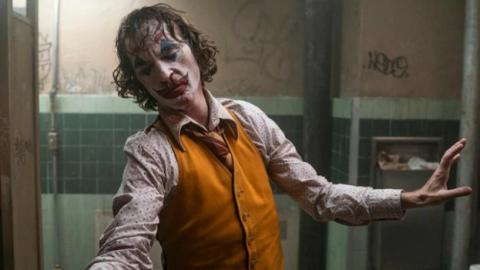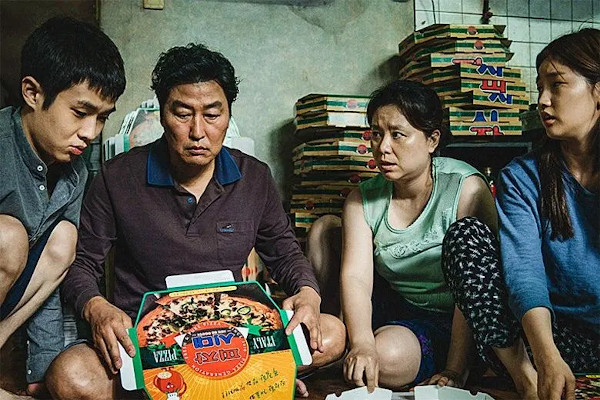With the Best Picture Nominations, the Oscars Unleashed the Monsters’ Journey

Opinion:
As a small child, I had a recurring nightmare that I was left behind in a parking lot as my parents and siblings walked away from me. But the nightmare always ended well, in that it ended, period. No nightmare we have while sleeping ever lasts longer than the time it takes us to wake up.
We have living nightmares as well. We can look to the meat-grinder that killed millions of young men in World War I (1917), the many who perished under Nazi Germany (Jojo Rabbit), or any number of more personal murders throughout our history (Once Upon a Time in Hollywood) to remind us of this. And yet, we often can point to a specific event or moment in time to demonstrate how such nightmares were no more – we collectively wake ourselves up, so to speak.
In examining the daunting reality we face every day, we consider the journey of the monster who perpetuates it. And when we consider the journey of this monster from beginning to end, we see how the nightmare unfolds.
It’s common for us to see someone like a psychopath (Jojo Rabbit) or a sociopath (The Irishman) and trace their history back to a point or a series of points of trauma. Without this confluence of events, they may not have turned out to be as destructive as they are. They experience hardship at an early, tender time, and thus their worldview is tainted from then on.
We see their harmless beginning, wherein the monster finds themselves fantasizing, perhaps “daydreaming” (Parasite) of a different reality than the one they face, having their expectations dashed (Marriage Story), or experiencing the disappointment of a lost opportunity (Joker).

We then see how they attempt to reconcile this gap in their world, be it using others for their own gain (Ford v. Ferrari) or destroying the things we love most (Little Women). The monster then justifies these actions through their sense of lack (Parasite) or to protect those they love the most (The Irishman).
The monster’s journey enters a surprisingly menacing phase when their actions become normalized (1917). They fit their actions into the standard way of things just enough to be perceived as someone merely misguided in their choices (Joker), and when they’re rewarded with success, they reinforce their worldview moving forward (Ford v. Ferrari). And thus, they tip into a reality from which there’s no coming back.
To perpetuate this worldview, they begin to manipulate the situation to suit their agenda (The Irishman), and they escalate their impact to the point of finally catching the attention of those around them and being labeled as the fiend they are (Joker).
And here is where the monster’s journey may diverge, as many live out their lives remaining in wholehearted devotion to the ideals that led to their destructive tendencies (Once Upon a Time in Hollywood). Still, some monsters come to realize that they are the catalyst of the nightmare that consumes their life, they “feel like (they’re) in a dream,” (Marriage Story) and seek repentance for their past (Little Women). But because of the nature of their actions, they often pay for it in incarceration (Joker) or perpetual isolation (The Irishman).
The impact of the monster’s journey reminds us of what’s at stake, be it the next generation of children who may continue the destructive cycle if they’re neglected (1917), or choices that lead to an untimely demise (Parasite). Without vigilance in fighting this monster, we risk enticing the darkest natures of others and creating the nightmare we so greatly fear.
But how do we find that vigilance? How can we respond in a way other than pretending that the monstrosity didn’t take place (Once Upon a Time in Hollywood)?

We see this darker tendency turn around in them when we help them avoid their decline in isolation (Little Women). We have the conversations that will help them to feel connected to another and thus no longer in a spiral of their own suffering (Marriage Story).
We must show them how to lean into the differences they see in others not from a place of hate but rather curiosity (Jojo Rabbit).
We must help them to move forward, no matter the setbacks they’ve faced.
As we study the monster’s journey, we’re shown how the nightmares we suffer through at their hands can come from a surprising place. Eventually, one of my family members did leave me, but not when I was a small child in a parking lot. My nightmare began only months ago when I lost my father to a medical error. I began seeing the word through a darker lens and felt more victimized by the little slights and humiliation that come with everyday life. But as I realized the nightmare I was about to enter, I chose connection over isolation, curiosity over hate.
I came to understand the main point that prevented the nightmare before it started.

As we move forward in 2020, we are presented with one of the most destructive, polarizing realities we’ve faced in many decades. We are presented with political and economic choices that may determine whether we live out our lives in a nightmare or not.
The Academy, through its nine best picture Oscar nominations, was trying to tell us that the nightmare is pending, and that it has a root cause.
They may be trying to tell us that the cause is the monster that lurks in each of us.
Author Bio:
Neil Gordon is a communications expert focused on helping his clients attract a following using as compelling of a message as possible. His style has been described as “persuasion with heart,” and he has helped his clients double their speaking fees and secure appearances on TV shows like Ellen and Dr. Oz. Gordon formerly worked as an editor at Penguin Random House with New York Times bestselling authors and has been featured on NBC Palm Springs, Forbes, Fortune, and Inc. Magazine.
For Highbrow Magazine





























































































































































































































































































































